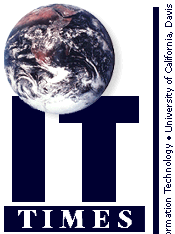
California Digital Library
by Beverlee French, General LibraryScholarly publishing is being transformed by information technologies. Whereas until recently knowledge was reviewed, edited, and fixed in an unalterable form, publishers are beginning to make their print journals available in electronic format. New journals, such as UCD Professor Art Huntley's Dermatology Online Journal, are appearing only in electronic versions. In order to provide important scholarly material to the desktop at any time and any place, the UC Davis Library has begun to license some of these materials for the UC Davis community. The UC Davis General Library's Web site contains links to electronic journals such as the Journal of Biological Chemistry, the American Journal of Mathematics, Modern Fiction Studies, and the Journal of Physics. The California Digital Library (CDL) has already linked articles from these and other full-text titles to its MELVYL System's abstracting and indexing databases.
The California Digital Library has evolved from several driving forces. Envisioned more than a year ago by UC President Atkinson as the "Cyberlibrary," the digital library will be shared among the nine campuses and even beyond the University. The mission is to provide a core of scholarly electronic resources to UC students and faculty. What many consider a crisis in scholarly publishing is also a motivating factor in making the journals available electronically. Periodical prices have risen 10 to 20% every year for the past ten years, and the portion of the scholarly output that UC libraries, like many research libraries, can provide to its faculty and students, continues to shrink. The California Digital Library is expected to facilitate changes in scholarly publishing that would allow universities and scholarly societies to manage knowledge review processes without commercial publishers.
The Library and Planning Action Initiative Task Force has recommended that the California Digital Library focus initially on building a critical mass of literature in science and technology, where the migration to electronic formats is most rapid. By delivering current publications via the Web through a consistent interface and structure (the MELVYL System), the CDL will save faculty and students time otherwise spent tracking down articles. Eventually, many publications will be available only in electronic format.
One of the University's operating principles is to license material only if every authorized UC student, faculty, and staff member is entitled to access the material from any location. Information Technology on our campus is already testing authorization and authentication mechanisms that will ensure secure remote access to the California Digital Library as well as to many other restricted University data files.
The California Digital Library will be created through the collaboration of librarians, faculty and information technology representatives from all nine campuses. Faculty groups thus far have been enthusiastic about the potential of the digital library. Over the next quarter, the science librarians at UC Davis will be concentrating on communicating with, and getting input from, faculty about the CDL science and technology collection.
Librarians are available to make short presentations to faculty or seminar groups and provide consulting services by email. They will gather recommendations on what to include in the California Digital Library.
Beverlee French is Associate University Librarian and UC Davis's representative to the CDL Science and Technology Task Force.
Resources:- Beverlee French: bafrench@ucdavis.edu
- General Library: http://library.ucdavis.edu
- California Digital Library: http://lpai.ucsf.edu:8080/outcomes/cdl
- Library and Planning Action Initiative Task: http://lpai.ucsf.edu:8080
- Academic Senate Notice: http://www.ucop.edu/senate/notice/nov7notc.pdf
- General Library: http://library.ucdavis.edu